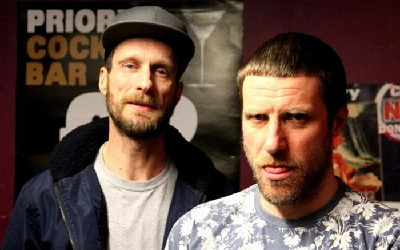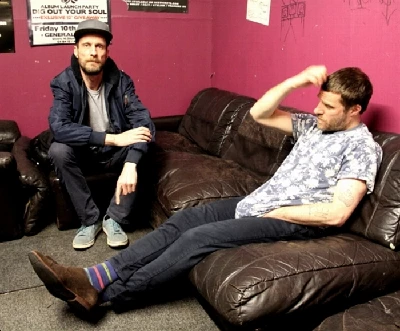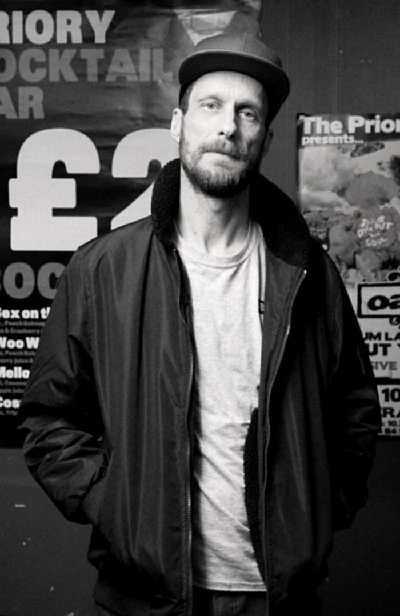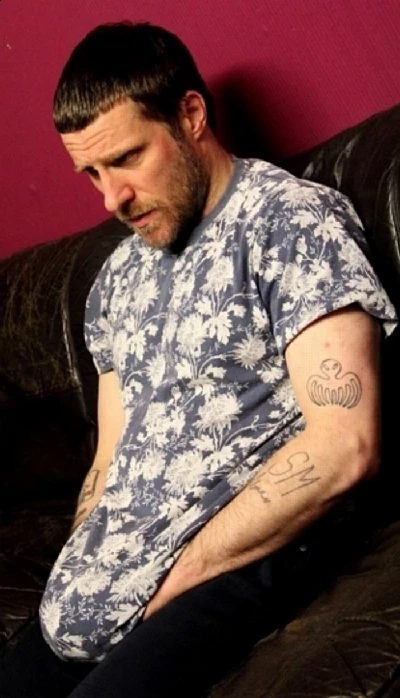published: 18 /
4 /
2015
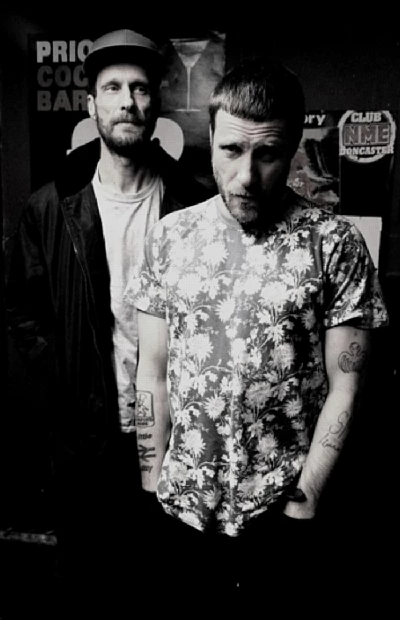
Denzil Watson talks to controversial post-punk/hip hop duo Sleaford Mods about their rise, working with the Prodigy and their plans for the future
Article
‘The Guardian’ loves them. They’ve just collaborated with the Prodigy on a track (‘Ibiza’) on the Essex trio’s forthcoming new album. Last year’s ‘Divide + Exit’ drew universally glowing reviews. So far 2015 is looking pretty rosy from the point of view of the Notts-based post-punk/hip hop duo. With a new album already in the tin and a number of high profile gigs coming up, their star is most definitely in the ascendancy.
Jason Williamson (vocals) and Andrew Fearn (beats and programming) both hail from Lincolnshire and first hooked up in 2012 when Williamson invited Fearn to join the band.
Pennyblackmusic caught up with them at Doncaster Priory, half-way through their Spring tour of less visited towns.
PB: How's the tour been going so far?
JW: Yeah...good.
PB: I've heard you've come across some interesting venues and interesting promoters.
JW: Yeah. Just the one,to be honest. He fucked it. to be honest.
PB: Was that the guy in Lincoln?
JW: It was fine, but we got there and he was pissed and we thought, "This is not going to work out". He had no sense of management or no sense of looking after the bands. I mean, you don't want fucking pampering but...
PB: But you want things to be proper, right?
JW: Yeah.
PB: You've been to Boston and you've been to Leamington Spa. Do you think you are in your element in these small town venues?
JW: We're at home wherever really. A gig's a gig. A small venue is good for the vibe and that, but big venues are alright. It just depends. It just depends on the soundman.
AF: Big places can be brilliant.
PB: With your set up you are very mobile, aren't you? I guess you can play some venues that other bands would find it difficult to play.
AF: Yes, I guess so. Any band can do that I suppose if they are prepared to play acoustically in the smaller places, but it wouldn’t sound the same.
Because we've got the backing track it sounds pretty much like the record, but not exactly the same though. I don't know what I'm trying to say really. I don't want to say that it's part of that MP3 culture, but it has got that modern approach to it in the sense of people DJing wherever and tipping up and playing their stuff which is what things are about now. It just makes it a bit more relatable.
PB: As you get bigger and bigger and you play increasingly larger venues. have you thought about changing the live format of the band or is just the two of you on stage one of the real aesthetics and strengths of the band?
JW: It works as it is at the minute.
AF: It is one of the strengths of the band, yeah.
JK: It's that no nonsense approach.
AF: If we added a bass player and he started popping up in some of the photos, people would go "Who's that guy?"
JW: It'll always just be the two of us, I think. And if we do decide to use additional musicians they'll just come in on the recordings. We use quite a few people, to be honest. But live there's absolutely no need for it.
PB: When did you notice that things were starting to go a bit crazy with the band? You've been around a while and as a duo since 2012 but when did you notice that things were starting to go up to that next level?
JW: I don't know.
AF: It just kind of grew really rapidly. Right from the beginning. Right from playing in Notts at The Chameleon. We played to eight people and then we went to Germany and did three dates; Berlin, Bremen and Hamburg. Then we came back to the same venue, and we had too many people in there and had to turn fifty people away [August 2013]. We were like, "What's that all about?" So, from then on it was a constant expansion, if you like, from that point.
PB: Was it down to you doing anything different back then or did it just happen organically?
JW: Nah, it just happened organically, naturally. There was nothing forced about the process whatsoever. We’re far too educated in engineering music to worry about whatever happened next. Whatever happened happened. Every time we wrote a tune it was good. It got to the point that every time we wrote one, 85% of the time, 90% of the time, it was good.
AF: It was always good! Some tracks were a little weirder and didn't really sound that much like a Sleaford Mods’ track.
PB: It's just amazing how things have just gone exponential, isn't it?
JW: Yeah, it has. It is a bit weird, it is. We’re trying not to think about it too much and just get on with it.
PB: I think it's refreshing because you have done it on your own terms, haven’t you? A lot of bands sell their soul, but you haven't. You've done stuff on your own terms. You've not had radio-play. You've not had a record company.
JW: But it is possible to do that. It's just takes a lot of work, self-management and self-exploration, I think. And most people aren't willing to do that. They just want the quick buck. Hence the reason music is the way it is right now.
AF: I think for us you've got to have something original to start with. And with Steve, it was Steve [Underwood, band manager] who organised Hamburg and those gigs. It was him that saw us on stage in the first place at The Chameleon and saw it. He's into music and he had some sort of vision as to how entertaining it was, and thought that other people would find it entertaining too. And off the back of that he was definitely right. I think he pointed us in the right direction in general. Again it wasn't over-forced. It was just the sort of things you should do if you are in a band.
PB: I think the thing that hit me about the band was that it was very direct and very uncensored.
JW: Well, it took a long time to get to that. Psychology is so embedded in industry norms and the ideology. You're not going to get radio-play if you do this or that.
AF: Even right through to back in the day and people worried about production, having the 'right' equipment and being afraid to send something off and release it because they can't produce it how they want to. Just fuck it and get on with it.
PB: I think people have lumped you in with punk as you are seen to have a DIY ethic in terms of recording and releasing stuff.
JW: Yeah, definitely. There is that kind of ‘refusal to conform’ idea that automatically gets attached to punk.
AF: Especially with the concept of production as there is a certain snobbery to it.
JW: I was listening to a bit of punk anyway. That was influencing me, but we're not traditionalists. We're both quite simple in that we're just waving from genre to genre.
PB: It's like when people try to pigeon-hole you and put stuff up and you think, "Oh yeah, I can hear a bit of that in there." It is difficult to pin you down in a single genre.
AF: But for people of our age, shouldn't it be that way? We've had all that different music.
PB: People do want to pigeon-hole you, don't they? Like "Listen to Sleaford Mods if you like..."
JW: It's the way that they can grapple with it themselves.
AF: That’s the thing that record fans do. Those that buy vinyl always try and say, "This track sounds like this”. I've had fans say, "Oh, on this track you get this bit off a Stranglers song."
PB: It's like Spotify suggesting tracks to you, isn’t it? It's almost taking the enjoyment out of discovering music.
AF: It's an algorithm, isn't it?
JW: Oh fucking hell, yeah.
PB: Coming back to the success of the Mods, it started to kick off with ‘Divide + Exit’ back in April of last year, didn’t it? But if you listen back to ‘Austerity Dogs, your album before that, there's no real sea change in your sound and ‘Austerity Dogs’ is a really strong album.
JW: Sure, yeah.
PB: But it didn't go mental back then but it did for ‘Divide + Exit’.
JW: I think ‘Austerity Dogs’ was creeping into the psyche. But because we work fast we had another album out by then.
AF: I think it's just the industry, as it does work fast and by that point we had more interest hence the bigger release of that [Divide + Exit]. So in that point everybody is at the mercy of the industry in some way. You have to work with a distribution company and so-forth, to get to a wider audience. You can gig and gig and gig, but they can do it for you overnight effectively to get your music out there.
PB: It must really please you that you picked up some good reviews for the last two albums from some of the high-brow press, like ‘The Guardian’, for example, who have been in on it quite early doors. Jason I think they described you as "the poet laureate of the council estate."
JW: That kind of irks me as we're not from council estates. It's offensive to people who live on council estates really. I think it's lazy.
AF: It's implying that he's faking something as he's never been on a council estate.
JW: For people living on council estates they're going to view it as like "Oh, look at these cunts". There was at the start never ever any mention of pride for any sort of working class roots or that. It was just observation about my life. And the press have just taken it as working class and council estates and singing about the masses and stuff like that. And that's fine as there is a little element of that.
AF: But it's the media obsessed with the sell-off of culture of things. Like "Ah, another concept we can sell off."
PB: "Let's package it up." And is there a working class anyhow these days?
JW: There kind of is but the working class don't work any more. They've been stripped of any sort of daily operation, so to speak. It's not like it used to be.
PB: In terms of working, you've both had quite a bit of change as you've given up the day jobs now to concentrate on the band full-time, haven't you?
AF: I was kind of in and out of work at the time.
PB: But Jason, you've given up your job, haven’t you? How has that been? Has it given you more space or has it been quite strange?
JW: A bit of both really. I found it hard to grapple with. Still do a bit. But I'm getting used to it.
PB: And now music is your ‘career’, isn't it?
JW: Yeah.
PB: And the dangers are that you get sucked into this big machine.
JW: In a certain respect, it's a little bit unavoidable. But it's kind of how you bounce off the walls really. We're going to get fucking crap for it. You just are. What can you do?
AF: It's an ugly business at the end of the day.
JW: You've got a sea of people looking at you who are inclined to feelings of jealousy, feelings of frustration, feelings that they have been misguided.
AF: And there's a lot of manipulation of how you are represented once you become a known face. And people are easily convinced to believe anything about you.
PB: How's your relationship been with the ‘NME’?
JW: Okay. It's been alright, but they're quite a sensationalist paper.
PB: When you were starting to break they were trying to put something in about you every week. It reminded me a bit of when the Arctic Monkeys were starting to get big.
JW: We kind of kept a bit of a distance because the way they write their articles is a bit weird.
AF: Certainly more alternative magazines and on-line things that reviewed us previously have kind of stepped away from us a bit, as people like ‘NME’ have reviewed us. But then again they are there to represent things that are really current.
PB: In terms of a lot of the stuff that you have been writing about, it was when you were doing your jobs. Now you've given up working and now you are doing music as a full time career, is that going to cut off some of the stuff you've got to write about or is there still plenty in the tank?
JW: It will change, won't it? And that remains to be seen, I guess.
AF: It doesn't make you any less aware of how it is to work in shit places. You still see people working in them.
JW: And you are still part of that fabric of society. It's all inter-connected. You're not all of a sudden elevated into a different sphere. You're still looking at shop windows and you're still paying your rent or mortgage. You're still dealing day-to-day with being a human being.
AF: I suppose that's the bigger idea of selling out, where you end up being driven around in a limo like some kind of weirdo. Getting your chauffeur to pick you up some fucking ice-cream.
JW: That's just a bit odd. That's not going to happen.
PB: You're also a dad, aren't you, Jason? That's another grounding thing, isn't it?
JW: Well it has to be, doesn't it? You've got to be there for your child. As much as I can be a twat at times, it's a commitment for life.
PB: There are some fascinating characters in your songs. Are they straight-up people or is there a bit of artistic licence in there?
JW: Most of them are real people. All of them in fact. Making up fictitious characters doesn't really interest me. Not that there's anything wrong with that.
You can get plenty of fucking mileage out of anybody that you find disagreeable or agreeable. You get plenty of mileage. It's right under people's fucking noses. I know I sound like fucking Paul Smith (Maximo Park), but it's everywhere, inspiration.
PB: Did you get any inspiration for some of the characters from your formative years in Grantham?
JW: Not really. I've not lived in from Grantham for a while. Well, I kind of did before I met Andrew and I was doing stuff on my own. Actually, there was plenty. Plenty of material from just going out for a drink. It was more the dead-end feeling of Grantham. I don't think there's anything wrong with living in a small town all of your life but it can put you into a certain sort of mind-trap sometimes. You're completely delusional. Certain people I knew gave out things like that and it was really quite horrifying. You know what I mean?
PB: One of your more famous targets, Ian McCulloch, recently struck a chord. Was that through observation or did you have an encounter with him?
JW: Just observation. Although I met him once. I went to see Echo & The Bunnymen at Rock City in Nottingham, and I met him after because some of my mates knew him. We all had a drink in the hotel bar, and they were all just talking about football. I know people love their football and all that, but I mean, for fuck sake.
PB: And then there was the high-profile spat was with Noel Gallagher, wasn't there?
JW: Yeah. I guess I've said all I need to say about people like that. I don't know the bloke but when you are at the bottom looking up and all these people are gallivanting around not really doing anything really good and just abusing the power it gets up your back.
And it's only a belief that all of my mates and everyone else shares really. These people have been so really far detached from things.
PB: Just looking forward to the rest of the year, so far it's looking very promising. You've got your track ‘Ibiza’ with the Prodigy coming out. It sounds fantastic and I guess that's going to bring you to a wider audience, isn't it?
JW: I don't really know. I just kind of did it. I'm thinking more about our album, to be honest. I did it because I liked the tune, and I thought it might open us out to another audience a little bit as well. And Liam Howlett is a really nice bloke. And obviously they've done some really good stuff. I view them as a band which has managed to keep themselves intact. They release all their albums independently in England. In America, they use majors but everything, from, what I understand, is their own ideas.
PB: So, if things keep going up on the current trajectory is that the sort of way that you'd like Sleaford Mods to operate?
JW: I'm not sure I'd be happy just playing stadiums all the time.
AF: You just want it to be different all the time. You want different things to happen, and you want interesting things to happen.
PB: Like, I guess, with the current tour, interesting things happen?
AF: Yeah. And I hope we can keep that going. I hope that it evolves and I kind of think of it being progressive.
PB: Do you think you are going to be able to do another tour like this?
JW: We're going to do a major tour in September at bigger venues, but the idea is to keep our feet firmly entrenched in the smaller kind of places as well. But we work fast and we work hard and I think after this next album we'll take a bit longer and take it easy a little bit more.
PB: Is the new album all done and in the can?
JW: Yeah.
PBM: Can you say anything about it?
JW: Well, it's called ‘Key Markets’.
PB: Have you worked the same way as you did with the previous two albums?
JW: It's a bit more sing-ey, some of it, isn't it?
AF: Yeah, a little bit more sing-ey.
JW: The music's a bit of a different style. I don't know.
AF: Yeah, there's a few more different styles in there. I guess it's a little bit more musical.
PB: Well, good luck with the rest of the tour and the new album later in the year. Thank you for your time.
Photographs by Denzil Watson
Band Links:-
http://www.sleafordmods.com
https://www.facebook.com/SleafordModsO
https://twitter.com/sleafordmods
http://sleafordmods.bandcamp.com/
Picture Gallery:-
